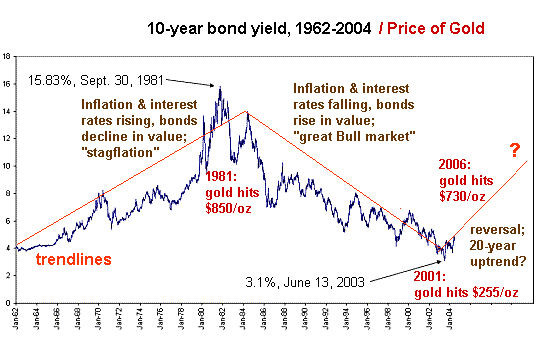

|
| weblog/wEssays archives | home | |
|
"I Wonder". . . If Interest Rates Will Rise (March 2, 2007) To complete this week's theme: I wonder. . . if interest rates will rise rather than fall. As housing and the economy weaken, the consensus is certain the Federal Reserve will cut interest rates to "prime the pump" for another orgy of consumer and speculative borrowing. But I wonder what could happen which removes the "cut interest rates" punchbowl from the Fed's party. I wonder what happens if the current "liquidity squeeze" removes so much wealth and appetite for debt from the global economy that no one has any more money to invest in new Treasury bonds. Recall that the Treasury has to issue hundreds of billions in new bonds to fund the deficit and old debt which has to be rolled over. If nobody lines up to buy the bonds, the interest rate has to rise, regardless of the effect on the economy. Recall also that the U.S. has long been dependent on foreign buyers of Treasuries to prop up our low interest rates. Some speculate that U.S. buyers will rush to the safety of Treasuries, replacing foreign buyers; but I wonder what happens to that scenario if investors have lost trillions in a declining stock market and derivative losses. Maybe the pool of capital available to buy Treasuries will have been reduced by losses to the point there isn't enough capital floating around to buy all the Treasuries being auctioned. This may sound far-fetched, but look at this chart, which suggests interest rates are in a long-term rising trend. What could cause such a rise--I wonder: 
Department of Corrections and Comments: Astute readers Karl N. and R.M. pointed out that the GDP is adjusted for inflation, so the anemic 2.2% rise in Q4 GDP was actual expansion. Karl puts the larger issue in excellent context: I believe GDP figures ARE already deflated using the PCE (overall, not just core). So the 2.2% number is a real (inflation-adjusted) figure. Now, given the governments fuzzy math with inflation and GDP, there's probably 2% of "fluff" subtracted from actual price changes and who knows how much added to GDP ( e.g., imputed rents), so in reality we might already be in recession starting in Q4 if price changes and GDP were measured the "old-fashioned" way.Thank you, readers, for setting the record straight. So let me rephrase my question: how can 2% growth--nearly noise given the welter of statistical legerdemain-- drive profits up 15% per year for another year or two? Contributor James C. responded to my critique of the media: I just read your March 1st post and wholeheartedly share your frustration with the mainstream media. I gave up on TV ten years ago and have avoided all mainstream media for the last year of so due to this bias in reporting that you talk about today. I have come to the conclusion that the reason we see such bias is because we are not really dealing with reality here, we are dealing with a Ponzi scheme and the only way to keep it going is to keep up the hype.Frequent contributor Aaron K. (and proprietor of the increasingly popular Mortgage Lender Implode-o-Meter) offered some explanations for the media's bullish bias: I have become fascinated (and infurated) with this phenomenon lately. I think there are a number of causes.Thank you, readers. For more on this subject and a wide array of other topics, please visit my weblog. copyright © 2007 Charles Hugh Smith. All rights reserved in all media. I would be honored if you linked this wEssay to your site, or printed a copy for your own use. |
||
| weblog/wEssays | home |